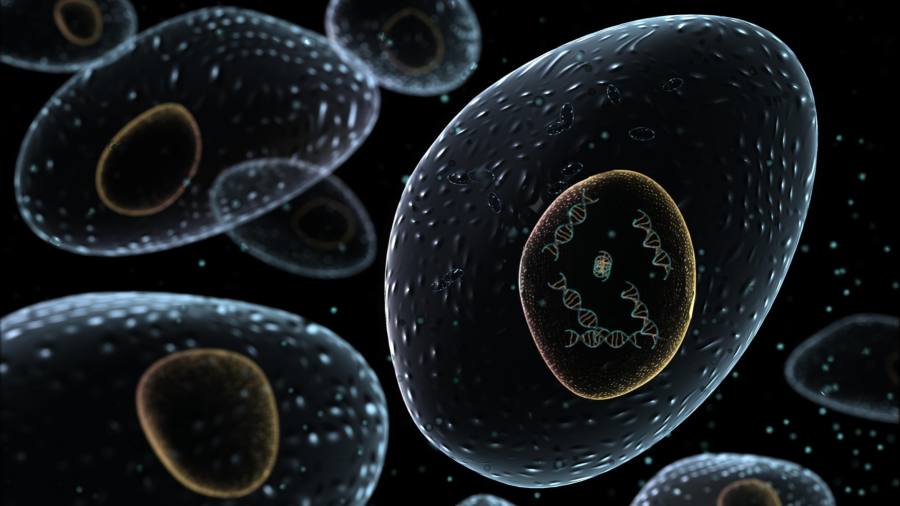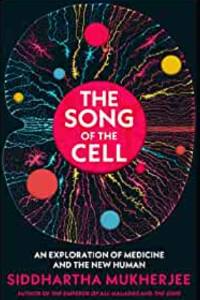
When does replacing the cells that cause cancer — or even a dodgy knee — cross the line into constructing a new type of human? Siddhartha Mukherjee questions how we distinguish treatment from enhancement, as he chronicles a new revolution in the biology of our building blocks: cells. The polymath believes we will move from curing illnesses to stealthily changing who we are. The new human will not be a science fiction vision of a cyborg from the film The Matrix, which he describes as “Keanu Reeves in a black muumuu”, but instead, “rebuilt anew with modified cells, who looks and feels (mostly) like you and me”.
In The Song of the Cell, Mukherjee takes readers on a journey from the discovery of the cell in the late 1600s to the present day, when scientists are using cells to create restorative therapies. Recent breakthroughs have enabled scientists to turn back the cellular clock to the original raw material — called stem cells — and begin to grow cells to order.
Mukherjee is a passionate, expert guide. As an oncologist, he spends his life studying cells that go wrong, causing cancer, and his lab at Columbia University has made its own significant discoveries in cell biology. He is also a skilled author with an eclectic style, honed in his last book The Gene and the acclaimed The Emperor of All Maladies, where he managed to make cancer compelling reading. He weaves together charming histories of scientists, his own, sometimes painful, memories of patients and friends lost to illness, and the complex science of what makes cells tick.
This book examines the potential evolution from cell therapies that we have normalised — blood transfusions, organ transplants, and cancer drugs that harness the immune system — to a new generation, which seem so futuristic that Mukherjee admits they induce “moral vertigo”.
For example, in vitro fertilisation (IVF) was controversial when it created the first “test tube” baby in 1978, but now, an estimated 8mn to 10mn babies have been conceived and born using the technique.
Yet IVF was also used to create the world’s first gene-edited babies. By combining the cellular therapy of IVF with Crispr, a groundbreaking gene editing tool adapted from bacterial immune systems, the Chinese researcher He Jiankui changed a gene in twin girls to protect against HIV. Scientists widely condemned the 2018 experiment as unnecessary and risky; and Jiankui was sent to jail. Mukherjee calls Jiankui’s presentation “one of the more surreal moments in medical history”. But he also pulls back to make the reader think more broadly about how it evolved from existing medical care: “What began as a treatment for human infertility is now being repurposed as a therapy for vulnerability.”
The author is in awe of the cell, declaring its story is needed to “tell the story of life and ourselves”, and arguing that we are not just living in the century of the gene, but also in a “contiguous, overlapping century of the cell”. The gene may provide the sheet music of life — the information — but the cell is the orchestra, playing the song of the title.
He zooms out from intricate scientific explanations and uses dramatic imagery to try to give the reader the same sense of wonder. This technique often works, because his collage of references drawn from novels or essays offers the lay reader a broader perspective, far from a biology textbook. But it sometimes becomes too breathless, and still fails to lighten the passages most dense with exposition.
A 10-page interlude on the Covid-19 pandemic is strangely sandwiched in between sections on blood and organs. Mukherjee argues that the emergence of Sars CoV-2 made scientists feel powerless. In the years before the pandemic, researchers had made huge discoveries about stem cells, and how tumours evade the immune system’s T-cells, but then “biblically, we tumbled”.
Mukherjee appears to still be processing what lessons we should learn from the pandemic. He quickly moves on, describing how after a year of thinking about the pathogen, “the constant metaphors of the battle had become denervating”.
The Song of the Cell lands after investors — including tech billionaires — have poured money into nascent longevity start-ups in recent years. Many are hyped as trying to “cure death”, but in fact, focus on rejuvenating cells. The book helps the reader understand the evolution of this potentially revolutionary science as it creeps into the mainstream. Mukherjee’s ambition has once again paid off, creating an Encyclopaedic exploration of how we got to this point — and sketching out the questions we must ask about the future.
The Song of the Cell: An Exploration of Medicine and the New Human by Siddhartha Mukherjee Bodley Head £25/Scribner $32.50, 496 pages
Hannah Kuchler is the FT’s global pharmaceuticals correspondent
Join our online book group on Facebook at FT Books Café
